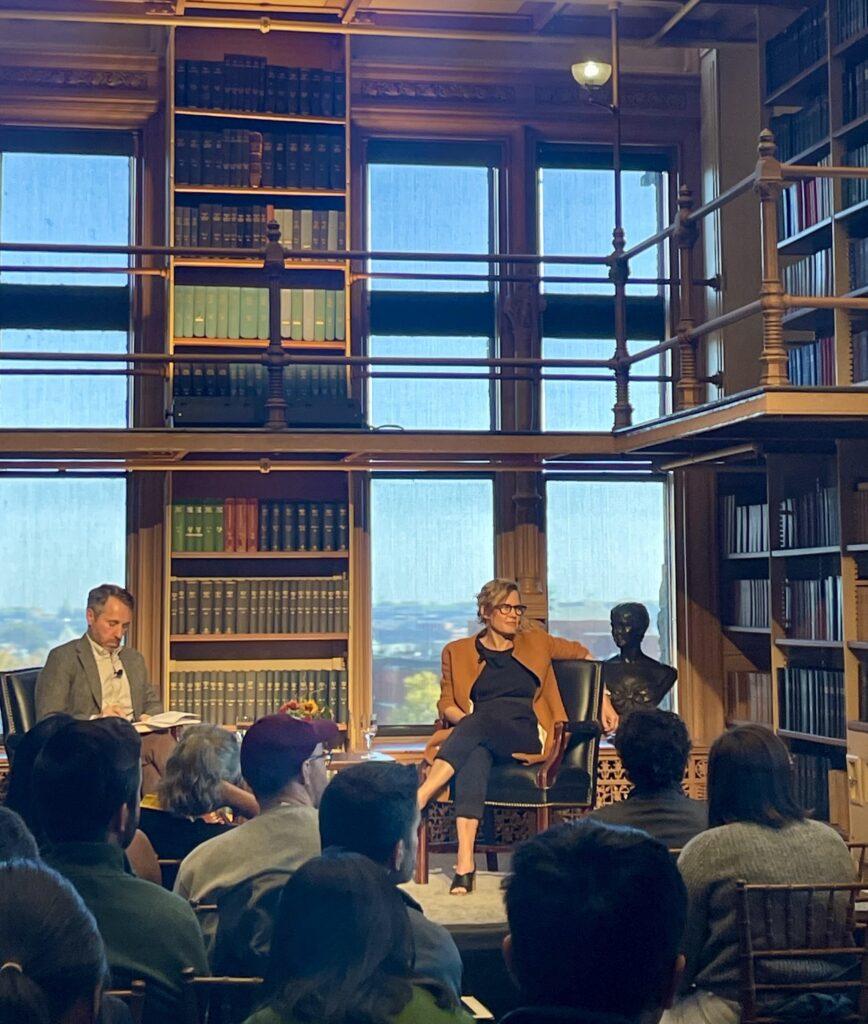Jennifer Pahlka, the founder of Code for America, a nonprofit organization that works to improve the government through technology, visited Georgetown University on Oct. 19 to discuss her new book on government and 21st century technology.
Pahlka’s book, “Recoding America: Why Government is Failing in the Digital Age and How We Can Do Better,” explores the challenges of technology in government and the barriers to implementing public policy. Donald Moynihan, the McCourt Chair at the McCourt School of Public Policy, moderated the discussion in Riggs Library.
Pahlka discussed changing the rigid culture of the federal government that disconnects policymakers from people, the gap between creating and implementing policy and improving the government’s approach to technology.
Pahlka founded Code for America in 2010 to advocate for “civic hacking,” which seeks to introduce modern technology to government processes. Pahlka later joined the Obama administration in 2013, playing an instrumental role in redesigning the Affordable Care Act (Obamacare) website after it crashed in the same year. Pahlka also helped create the U.S. Digital Service, which improves accessibility to digital services and simplifies them.
Pahlka said technology brings policymaking and policy implementation together by making it easier to connect with citizens, emphasizing the overarching importance of rolling out policies.
“There is a separation between policy and implementation, and much of the dysfunction derives from that,” Pahlka said at the event. “We need government seen through a technology lens, but we have to see through the technology and see the government. So much of implementation happens through digital means.I think it’s a useful frame, but we shouldn’t get caught up in the technology part of it and miss the implementation.”

Pahlka said one value of the civic technology movement, which started with Code for America, is reducing burdens in policy and refocusing services toward the users.
“The civic technology movement as a whole values the person who’s going to be using the software over a set of arbitrary requirements. A set of requirements are government needs instead of user needs,” Pahlka said. “Civic technology brings more tools to the table that are really more robust. They’re watching who’s using the applications, the lives they’re living, the constraints and opportunities.”
Pahlka said she originally started writing her book with a focus on technology in government, but many of the chapters developed a concept of state capacity, or the ability for governments to provide services and benefits to citizens.
“They’re about the idea that we say we’re going to do one thing in government and that thing doesn’t happen. I call that the implementation gap or delivery gap,” Pahlka said. “If what we’re really talking about here is we say we’re going to do one thing, and it doesn’t happen, then we have a problem of state capacity.”
The two solutions Pahlka proposed to build state capacity are hiring more people to do the right jobs or reducing burdens on those people to get more done. Moynihan questioned Pahlka about the differing views on reforming the administrative state, pointing to political polarization.
“Within the administrative state, is there room for bipartisan movement? Because the people most politically engaged in talking about the administrative state have a very different view,” Moynihan said.
Pahlka said the differences in Democratic and Republican philosophies were surface level, with similar goals of simplifying government for everyday people and reducing burdens.
“Our observation at the time is that what the left would call reducing administrative burden is not that different from what the right would call deregulation,” Pahlka said.
Pahlka said technology can be a force for good if policymakers use it correctly with the users in mind, differentiating between stability and agility.
“I think the things like user research or creating digital services to reduce burdens are these unicorns that nobody thinks exist. But they do, and they are cheaper, faster and better,” Pahlka said.
One of Moynihan’s last questions involved the urgency in reforming government as more people lose trust in the government. Pahlka said politicians should not be afraid to challenge the status quo as more people become disillusioned with government.
“And sadly, I think that frustration with the status quo is actually feeding populism and the increasing willingness to accept authoritarian leadership. We are going to have to blow things up in little ways — in ways that are controllable, limited in their impact, but do sort of shake up the system. If we don’t do those little blow ups, we’re going to end up with a big blow up that destroys the system as we know it,” Pahlka said.




















